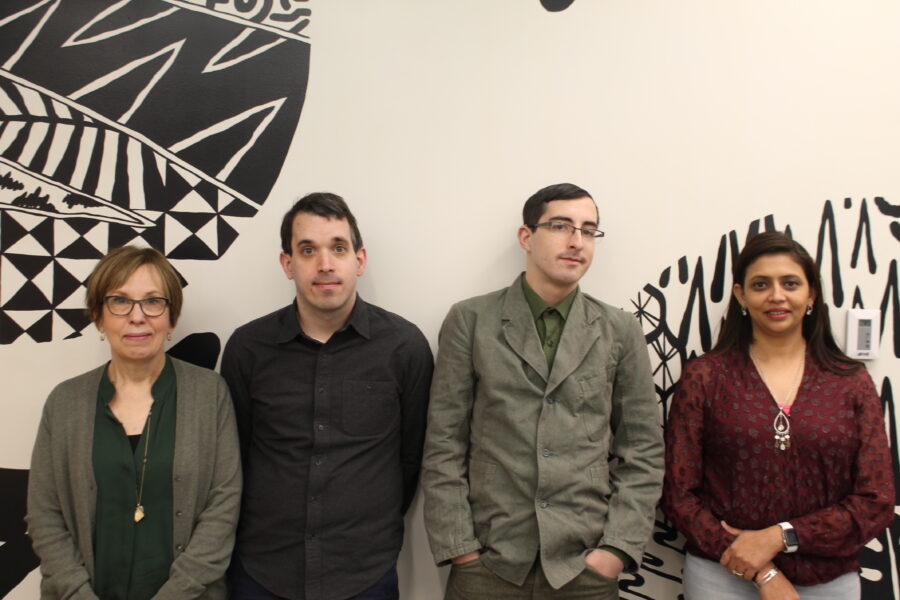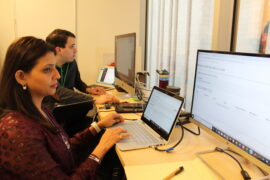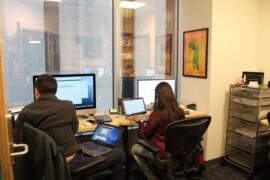Author

Blogs
Article & Observations About Diverse Teams Working Better Together
The Rhythm of Finding Work as Women in Tech

Ask yourself, what challenges do you see your co-workers face every day due to a disability? If you’re like many people, you don’t have any frame of reference. The article “Do Your D&I Efforts Include People with Disabilities?” cites a report from the Return On Disability Group that “90% of companies claim to prioritize diversity, [but] only 4% consider disability in those initiatives.” [1]
July 26, 2020 marked the 30th anniversary of the Americans with Disabilities Act (ADA). Passed by Congress and signed into law by President George H. W. Bush in 1990, the ADA established protections for people with disabilities in employment, government, and publicly funded spaces. [2] The law was designed to help provide access for employment opportunities equal to those for people without disabilities.
“Businesses have long been drivers of social change. Across the globe, companies have begun acknowledging vital challenges and injustices such as climate change and pay gaps. Diversity and inclusion initiatives is one such defining issue, and although huge progress has been made towards equality across boundaries of gender, race and sexual orientation, one aspect of D&I is too often neglected: disability.” [1]

Diversity, Equity, and Inclusion (DE&I) is one of the most important and timely topics companies are addressing today. HR departments are actively recruiting diverse talent and companies are hiring DE&I leaders, as well as training managers to build inclusive teams. Iterators LLC has recognized DE&I since its inception. We were founded on the principle that people with diverse backgrounds enhance and strengthen software testing outcomes. Being a women-owned small business (WOSB) presents both advantages and challenges in the technology field. Just as with people in neurodiverse groups, "traditional" companies often perceive women to be either less qualified in this field or to have received special treatment if successful. [3]
We were contacted by the chief information officer for a medium-sized employer in financial services outside of Boston. A complaint was filed because their website and electronic assets were not accessible to individuals with disabilities. As a WOSB, certified by the Department of Homeland Security in Accessibility Section 508 / WCAG, we were thrilled that Iterators’ diversity of testers (women, neurodivergent, and BIPOC employees) would be able to add value to this project. Imagine our surprise after discussing the steps we can take to reduce their risk (due to nonconformance) when asked, “We can use our foundation dollars to pay your fee, right?”
Prior to opening our doors in 2017, we had the diversity of thought that comes from thinking and rethinking about what our goals were in establishing Iterators LLC. We chose a for-profit WOSB because individuals with disabilities should not be limited to finding jobs with nonprofit organizations. As essential as their work is, it leaves the connotation that having a disability prevents success within traditional businesses, the work being less valuable—a charity. “When there's a lack of diversity in the room, critical ideas and opinions can be missed.” [3] We wanted to ensure an equal voice for women.
The law was designed to help provide access for employment opportunities equal to those for people without disabilities
ADA.gov United States Department of Justice Civil Rights Division
Within the same timeframe, we received a call from an investment management firm, Loomis, Sayles & Company. They saw an article about Iterators LLC in The Boston Globe and called us to discuss a data analysis project. [4] In casual conversation, they volunteered they had tried to hire someone to complete this work but added “they all want to work for Google.” We were thrilled to take on this work and have been completing this weekly analysis for the last three years. We receive data files every Saturday and complete the analysis on Sunday. Initially, this was a manual project, but we automated the process using Python once we found we had a stable environment. Automating this project was beneficial should the client ever need to increase the analysis from weekly to daily as an example. It takes about four hours for the program to run, with a report generated when the data analysis is done.
Our client writes: “In order to effectively support our ever-evolving business needs, we have to be agile in our data transformation and software development efforts. Having a partner like Iterators helps us ensure that our weekly software releases are producing accurate, consistent results and is extremely valuable. Thank you, Iterators, for your commitment to neurodiversity and your commitment to providing valuable services to firms in the Boston area.”

Going back to our conversation with the chief information officer, when asked, “We can use our foundation dollars to pay your fee, right?” we responded that our fees cannot be paid through a nonprofit or foundation. Foundations must meet or exceed spending at least some of their assets on charitable purposes, and we are not a charity. We never did complete any work for this potential client.
I’m often asked as a WOSB owner and employer by competitors if we get all our work from “set-asides,” and I perceive our work is being discounted, undervalued. [4] When asked “We can use our foundation dollars to pay your fee, right?” I feel the same way I felt when asked if all our work comes from set-asides. A better question would be: Why don’t companies employ more WOSBs and women to gain a diversity of thought while positively impacting their bottom line by hiring people with disabilities?
1. Casey, Caroline. “Do Your D&I Efforts Include People with Disabilities?” Harvard Business Review. 19 March 2020. https://hbr.org/2020/03/do-your-di-efforts-include-people-with-disabilities. Accessed 19 March 2021.
2. ADA.gov United States Department of Justice Civil Rights Division. Introduction to the ADA. www.ada.gov/ada_intro.htm. Accessed 19 March 2021.
3. Willcox, Jill. “The Good That Comes With Women in Tech” Iterators LLC. 5 March 2021. https://iteratorstesting.medium.com/the-good-that-comes-with-women-in-tech-d318016515ff. Accessed 19 March 2021.
4. Johnston, Katie. “Companies tap into an underused but highly capable workforce.” Globe.com. 28 November 2018. https://www.bostonglobe.com/business/2018/11/28/companies-tap-into-underused-but-highly-capable-workforce/6JyOew103lGJVq9ajfjrOI/story.html. Accessed 23 March 2021.
Relevant Resources:
About the Author
Jill Willcox has worked on accessibility issues for most of her professional career. Iterators is an inclusive women-owned small business (WOSB) certified by the Small Business Administration and WBENC. We provide software testing services for websites, mobile apps, enterprise software, and PDF remediation services, rendering PDFs ADA compliant.

